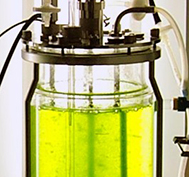News Archive
New BMBF project: ThermoSynCon (Feb 2020)

Synthesis gas (syngas) mainly consists of hydrogen (H2), carbon dioxide (CO2) and carbon monoxide (CO) that accumulates as waste gas in steel milling or can be produced from biomass by incomplete combustion. The bio-based conversion of this versatile energy carrier to fuels and valuable chemicals (Syngas fermentation) is of high economic and social interest, since it is a sustainable technology that captures CO2.
Syngas fermentation is carried out by anaerobic bacteria that naturally mostly produce acetic acid (acetogens). Currently, the process is mainly studied with mesophilic acetogenic bacteria (TOPT 30–40°C). However, fermentations at elevated temperatures have several advantages, including a lower risk for contamination, higher conversion rates, and lower cooling costs. Moreover, only a handful of thermophilic acetogens have been described, incl. Moorella thermoacetica und Thermoanaerobacter kivui. A syngas fermentation process at high temperature has not been established.
Hence, in “ThermoSynCon”, we will study the potential of thermophilic acetogens and develop them into platform strains for industrial application.

